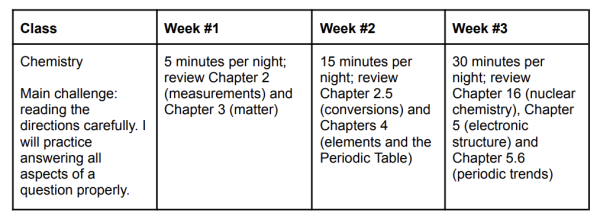It’s January, which means three things – Christmas is over, it’s too cold outside, and midterms are coming up. The third item on that list might be particularly daunting, as you likely have never taken a midterm before. Even if you have sat for a cumulative exam in the past, as a high schooler, you must take midterms for multiple classes; just last year, I took five in three days with some other students having even more.
Your teachers might have begun talking about the exams. Perhaps they’ve given you a review packet or told you that you should be scared (hopefully not). After all, midterms encompass 10% of your final grade for a 1.0 credit class; these tests are important, and you should prepare accordingly.
When I was anticipating my first midterms, I felt nervous, because I had no idea how to study for one test with the scope of a whole semester, let alone five. If you’re anything like me, you’re feeling a little anxious too. And that’s perfectly ok! My goal is to give you some advice on studying for these tests so that January doesn’t become a month defined by stress.
I’ll let you in on a little secret: midterms are not nearly as bad as you might think. That’s right! They consist of content you are familiar with and on which you have already been assessed. When you sit for your first test, you will quickly realize that you have all the tools in your arsenal to obtain a good score.
That said, these exams are comprehensive, covering material from the entire school year thus far. You have to study, and you have to study well. If you don’t review your knowledge from the beginning of the year, don’t expect midterms to be a breeze.
Here’s a strategy that helps me: thoroughly review all past tests you have taken. Scan them for mistakes and try to pick up on patterns. Do you make a lot of careless errors (these can add up frighteningly fast), even though you have a solid grasp of the concepts? Do you frequently misread questions? Have you consistently struggled with a particular unit or skill? Identifying your strengths and weaknesses is a great jumping-off point when preparing for your midterms. If your teachers do not allow you to keep past tests, visit them during Lunch and Learn to ask if you can look them over.
Once you’re aware of what you need to work on, you can create a study plan for each class. A good plan will include specific goals. Don’t just say you’ll “practice writing proofs” or “review the Bill of Rights.” Create goals that are manageable, realistic, measurable, and time-bound.
You can pursue your study plan however you like; all students take a unique approach to learning, so it’s important to discover effective strategies for you. But in general, I recommend making a schedule that gradually increases your studying over time, as this will help you ease into midterm review. Additionally, reviewing class concepts over a longer period will help you solidify your knowledge and recall it on exam day. Don’t underestimate the power of long-term revision!
This is the way that I have tackled midterm season with success. Of course, you can make any adaptations you want:
Break down the next month into weeks – Week #1, Week #2, etc. Start with one class in Week #1 (I’ll use biology as an example). Commit to studying biology for a certain amount of time each night for the whole week. In the beginning weeks, keep this time brief. I would suggest five minutes per night if you are rocking biology and closer to ten if it’s a challenging class for you. At the start of Week #1, revisit concepts from September or October (use old tests, PowerPoints, essays, and labs) and pay extra attention to material you find difficult. For instance, if the phases of mitosis keep slipping your mind, go over them for just a minute or two each night. You might notice that past chapters are starting to come back to you – remember, you already know this stuff! Furthermore, for STEM classes, the material tends to build heavily on itself. So, you may still need information from months back while tackling new units. Nailing the foundations is critical.
Create a plan like this for each class with a midterm. For Week #1, you shouldn’t be spending more than thirty-five minutes per night on midterm studying, because you still have other assignments from your classes at the beginning of January.
Once Week #2 rolls around, increase your nightly studying time for every class by five to ten minutes. Continue to emphasize tricky concepts.
By Week #3, you should be spending a lot more time on midterm studying. Most teachers will slow the flow of new work, so you will have available time on hand. Allot thirty or forty minutes for your hardest classes, and start to take practice tests, if you can. I also recommend making Quizlets to help you study vocabulary, especially for foreign language classes. ChatGPT can even be an excellent tool—you can copy and paste your class notes into the chatbot and ask it to create a neat study guide or even some practice questions! Make sure all gaps in your understanding are closed. For your other classes, stay in the range of twenty to thirty minutes per night. By the end of Week #3, you should feel confident in your readiness for the midterms.
If you’re still struggling, talk to your teachers. They are aware that these are your first midterms as RHS students, and they will be more than willing to support you. See teachers in the morning before homeroom, during Lunch & Learn or free periods in the Learning Center, or attend the Extended Learning Program after school (all students are part of a Schoology group for the ELP where you can find the Zoom links).
Everyone gets worried about midterms at some point, especially when it’s your first time. Staying on a regular sleep schedule (no all-nighters), eating well, and hanging out with your friends can make the next few weeks less painful. But if you find your anxiety to be overwhelming, please talk to someone about it. Make your teachers aware of your concerns; maybe they can tell you what to expect on the exam. Meet with your guidance counselor, who can help you find ways to cope with stress. Talk to your siblings or upperclassmen friends who have been in this position before. Just remember that you are not alone. Before you know it, midterms will be over, and even if they don’t go as well as you hoped, you will have a brand new semester to improve. However, many students will be pleasantly surprised by their midterm performance; as long as you put in the appropriate effort to prepare, you could be one of them.
Happy January and good luck!
Chayse Hevesi
P.S., here is a sample study schedule to help you out:









